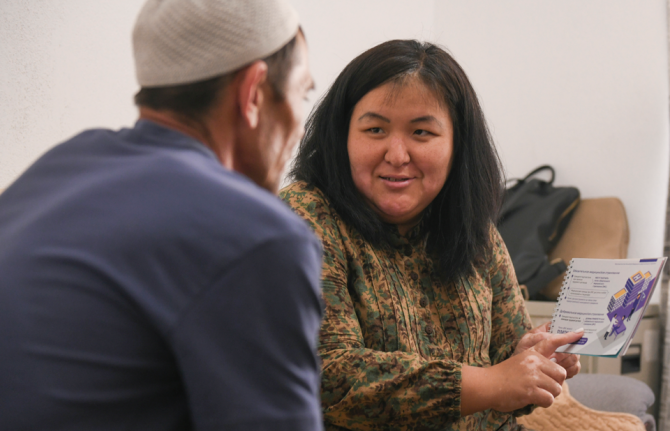
Feature Story
Health and safety: sex workers reaching out to sex workers
26 February 2019
26 February 2019 26 February 2019Leaving the meeting of the REVS PLUS nongovernmental organization, the women bid each other farewell, saying, “A demain soir (See you tomorrow night).” They had gathered at a health drop-in centre that also acts as a network hub for various HIV networks in Bobo-Dioulasso, Burkina Faso, to discuss the following evening’s plan: HIV testing among their peers at selected sites.
“We share our experiences and act as confidantes,” said Camille Traoré (not her real name), a sex worker and peer educator. Her colleague, Julienne Diabré (not her real name), wearing a long flowing dress, chimed in, “In our line of work, it’s hard to confide in someone, so confidentiality is key.”
REVS PLUS/Coalition PLUS advocacy manager, Charles Somé, described the group of women as an essential link in the chain to reach out to sex workers.
“Because of stigma and discrimination, many sex workers hide and move around so they miss out on health services and are much more likely to be infected with HIV,” he said. HIV prevalence among sex workers is 5.4% in Burkina Faso, while it’s 0.8% among all adults in the country.
By recruiting peer educators who know the realities of the job and can relate to other women, Mr Somé said that HIV awareness has increased in the community.
“We also innovated and started HIV testing in the evenings in places where sex workers gather,” he said. Prostitution in Burkina Faso is not illegal, but the penal code forbids soliciting.
The following evening, along a darkened street, REVS PLUS set up foldable tables with two stools at each table. A solar lamp allowed the peer educators to see in the pitch dark and jot down information. Donning plastic gloves, the trained peer educators sat with women, who had their finger pricked and within five minutes were given their HIV test result. No doctors, no nurses were needed. The testing was done by peers because sex workers are afraid to be identified as sex workers.
Mr Somé explained that over the years REVS PLUS outreach has gained the trust of sex workers.
Peer educators, he said, regularly called him to complain about police violence. “It went from arbitrary arrests, to stealing their money, to rape,” Mr Somé said.
Ms Diabré described her dealings with the police. “During the day they point a finger at you and discriminate, while at night they become all nice to get favours and if we don’t deliver then it gets ugly,” she said.
After documenting police abuse for a year with the help of bar owners and feedback from sex workers, REVS PLUS met with government officials and then the police.
“Our approach got their attention and we started awareness training with police officers based on law basics and sex work,” Mr Somé said.
Slowly, REVS PLUS identified allies in each police station, facilitating dialogue whenever an issue occurred. In addition, all sex workers now need to carry a health card showing that they have had regular health check-ups.
A Nigerian woman wearing purple lipstick, Charlotte Francis (not her real name), said, “We still have issues and stay out of their way, but it’s gotten better.” She waved her blue health card, which she says bar owners regularly demand.
Showing off his bar and a series of individual rooms around an outdoor courtyard, Lamine Diallo said that the police no longer raid his establishment. “Before, police would haul away all the women and even my customers,” he said.
UNAIDS, with funds from Luxembourg, is currently partnering with REVS PLUS to scale up the police awareness training across the country. Trainings have taken place in the capital city, Ouagadougou, and in Bobo-Dioulasso.
UNAIDS Burkina Faso Community Mobilization Officer Aboubakar Barbari sees the programme as two-fold. “We supported the awareness sessions for police and security forces because it not only reduces stigma, it also puts a spotlight on basic human rights.”
Special page
Region/country
Related
 Impact of the pause of US foreign assistance in Côte d'Ivoire
Impact of the pause of US foreign assistance in Côte d'Ivoire

19 February 2025


